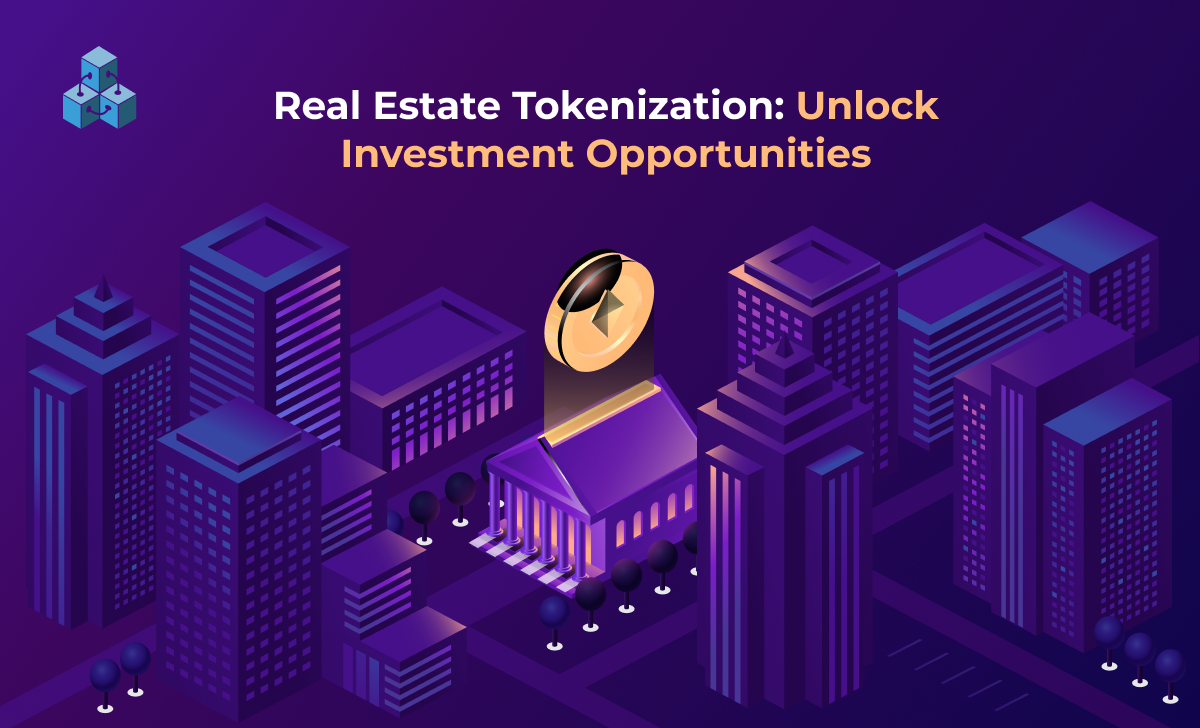Blockchain technology continues to penetrate the complex world of real estate. Blockchain technology introduced the industry with tokenization capabilities. It brings the potential for transparency, liquidity, and inclusiveness. Property investment has been long believed for exclusively wealthy individuals. It becomes hard to access potential investors due to high costs, lack of liquidity, and complicated processes.
Here, real estate tokenization comes into play, revolutionizing the traditional way of investing and interacting with real estate assets. Real estate provides the most stable and lucrative investment opportunities. This blog will explore real estate tokenization and how it can help unlock exciting investment opportunities.
Real Estate Tokenization: The New Revolution
Real estate tokenization refers to transforming the ownership rights in real estate assets to digital tokens on a blockchain platform. The tokens represent the ownership shares in the property and can be bought, sold, and traded. These digital tokens are also known as security tokens. The main idea behind tokenization is breaking traditional real estate assets into small and accessible units. It helps a broad range of investors to invest and participate in the market. The investors hold the right to sell as many shares as they need.
The Benefits of Real Estate Tokenization
Real-estate tokenization offers various benefits that hold the potential to revolutionize the way we invest and interact with real estate assets:
1. Accessibility: Real estate tokenization allows a broad range of investors to participate, including those with limited capital. It ensures to lower the entry barriers, which is impossible with traditional methods.
2. Increased Liquidity: Real estate tokens are highly liquid, and investors can trade them anytime, providing them with flexibility. It facilitates easy access to funds while enabling effortless exit from the investment if anyone wishes so.
3. Fractional Ownership: Tokenization allows fractional ownership. The investor can own a fraction of a high-value property while another can hold the other fraction, diversifying their portfolios.
4. Transparency: Blockchain technology enables transparent ownership records transaction history and helps reduce the risk of fraud and hacking.
5. Reduced Costs: Blockchain technology eliminates intermediates, which reduces paperwork while streamlining the transaction process and resulting in cost savings.
6. Global Reach: Tokenization helps break down geographical limitations and opens up investment opportunities to a global audience.
7. Security: Blockchain offers robust security features to safeguard digital assets and ownership records from authorized access.
Enter the World of Real Estate Tokenization
Real estate tokenization involves converting ownership rights of real estate assets to digital tokens on a blockchain. The tokens represent ownership of property and trade like cryptocurrencies. Here is how it works:
1. Property Selection: A real estate asset, a residential property, commercial building, or land, is targeted for real estate tokenization.
2. Legal and Regulatory Compliance: Ensure legal and regulatory compliance with law, property rights, and security regulations. It is essential for a secure and legitimate investment.
3. Token Creation: Self-executing contracts, known as smart contracts, are embedded with codes used to create tokens and represent ownership shares. These codes use blockchain standards like ERC-20 and other protocols.
4. Offering and Investment: Investors can buy these property digital tokens via a token sale. This token will represent their ownership of the underlying property. The process is typically conducted via a Security Token Offering (STO) or Initial Coin Offering (ICO) that complies with securities regulations.
5. Ownership and Governance: Token holders have ownership rights and may receive rental income or profit-sharing in proportion to their token holdings. The holder may have voting rights regarding the property, such as renovations and leasing agreements.
6. Liquidity and Trading: Investors can trade these tokens on secondary markets, enabling high liquidity and flexibility to those who want to buy or sell their ownership shares.
Challenges and Considerations
Real estate tokenization presents various opportunities, but it also presents challenges and considerations:
1. Regulatory Compliance: To avoid legal and jurisdiction issues, comply with the security laws and regulations.
2. Security: It is essential to safeguard digital assets and secure blockchain platforms to prevent hacking and unauthorized access.
3. Market Adoption: The real-estate tokenization adoption varies from region and market. Regulatory clarity and investors play a crucial role.
4. Technology Risks: Since blockchain technology is still evolving, there are risks associated with its use.
Conclusion
Real estate tokenization is revolutionizing the world around real estate investment. By tokenizing physical assets into digital tokens, access to real estate is easy, more exclusive, and liquid. While there are challenges, including the potential benefits of accessibility, liquidity, and efficiency, ensuring that real estate tokenization becomes an exciting frontier in both real estate and blockchain technology. As real estate tokenization continues to evolve, it persists in providing new investment opportunities for individuals.
Are you looking for a Real Estate Tokenization Development Company? We are here at your service. Give us a call, and we can discuss your project requirements. Connect with us today!
 info@blockcoders.pro
info@blockcoders.pro
 Our global presence :
Our global presence :
 |
|
 |
|
 |
|


